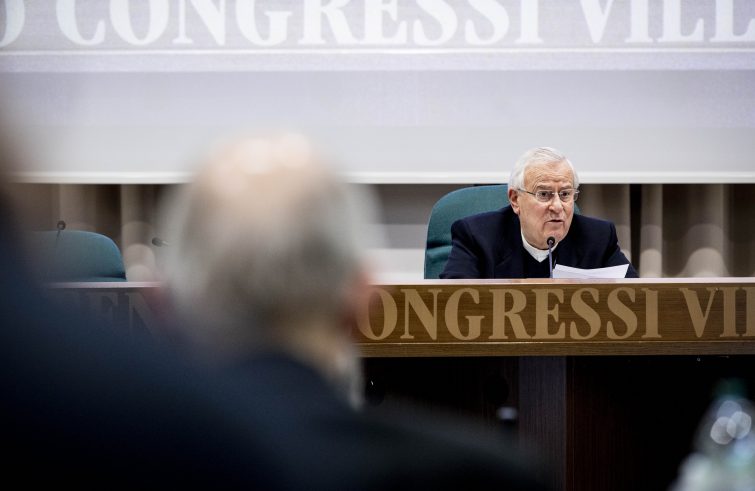
The times we are living in are “deeply marked by the fear of a virus, by fear of others and indeed of history”, said Card. Gualtiero Bassetti, archbishop of Perugia-Città della Pieve, President of the Italian Bishops’ Conference, in the opening speech at the Permanent Council of Italian Bishops, ongoing in Rome until January 26. People are showing “visible signs of fear”, the Cardinal noted: “a widespread fear not only for the present, but also for the future.” “Many people, especially the young, are starting to feel that they have been stripped of something that would have been granted to past generations”, the cardinal stated. “There are plenty of reasons to be concerned about public health, the economy and, more generally, the country’s social stability.” Therefore, it is necessary to “start from the existing sounds and noises, that is, from actual reality”, as the Italian Church has been doing in this first year of the Synodal Journey called for by the Pope, which “is stirring growing enthusiasm within our communities.” Young people represent an important aspect of the “social and political challenges we are facing”, Bassetti said in the wake of President Mattarella’s New Year’s message: “Don’t stop, don’t get discouraged, take the future in your hands, for only by doing so will you be able to donate it to society”.
The future of young people. Undeniably, the latest data is a cause for concern: “children fare worse than their parents, grandchildren fare worse than their grandparents. Poverty in Italy grows as age declines. Over 80% of dioceses report widespread youth-related poverty and needs.” “Young people are probably the hardest hit by the pandemic, but they could also be the architects of a change of era, of a reverse trend”, the Cardinal explained: “This can be seen in their desire to contribute and to show solidarity, as demonstrated in this time of crisis with thousands of new volunteers under 34 years of age joining our Caritas networks.” “Young people are the new springtime of our country and of the continent as a whole,” Bassetti reiterated: “It is our responsibility to accompany and support them, in the belief that without springtime we can’t move forward”. Pope Francis’ meeting with Italian adolescents in Rome on 18 April is the first public event dedicated to young people.
The challenge of the “Mare Nostrum”. “We should not delude ourselves into thinking that we can protect ourselves by withdrawing into our own borders, nor can we disregard the events unfolding in the region surrounding the Mediterranean Sea (Mare Nostrum)”, is the appeal of the President of the Italian Bishops’ Conference with regard to the ongoing tensions, not only in Europe. “The situation on the international geopolitical stage is dramatically escalating”, is the Cardinal’s cry of alarm, not least “in relation to Ukraine.” To this regard, Bassetti reiterated the Italian Church’s decision to promote the Meeting on the Mediterranean, which will bring together in Florence, on February 23-27, bishops and mayors from countries bordering the Mediterranean Sea, two years after the first such meeting was held in Bari.
Inflation and social alarm. On a national level, the Cardinal noted that rising inflation “is causing widespread social alarm also because, unless it is restricted within reasonable limits, it could develop into a latent and unfair form of taxation that hits lower and middle income households in particular, those most exposed to rising consumer prices.” The president of Italian bishops appealed to national institutions to “put in place all available remedies to protect the weakest, especially in the light of a dramatic rise in inequalities caused by the pandemic.” The Cardinal mentioned the impact of rising energy costs among the resulting negative repercussions.
No to the referendum on consensual homicide. “The referendum proposal seeking to liberalise consensual homicide by exploiting situations requiring completely different responses is a source of great concern”, the cardinal cautioned in the final part of his introductory remarks. “It is precisely in such situations of extreme fragility that our ability to listen becomes a form of accompaniment and help, indispensable to rediscover new reasons to live”, the cardinal assured, stressing that “protecting the most vulnerable among us is a duty – and not only in economic terms. In times such as these, the allure of the “throwaway culture” becomes more insidious, and it could pave the way for the adoption of provisions that undermine the legal grounds for protecting human life.”
Global access to vaccines. “A society that aspires to be a community must responsibly protect the health of those unable to access this means of protection”, said the president of the Italian Bishops’ Conference on the subject of vaccines. “It is necessary to undertake a joint effort to ensure widespread vaccine coverage. At the same time, efforts must focus on sending vaccines to countries where they are lacking, by means of a genuine donor mechanism for poor countries,” he urged. At the end of the speech, the president expressed his gratitude to the priests, who have been “close to the weakest” in this time of pandemic; to consecrated men and women, who “have remained in the trenches in the most critical circumstances”, and “to the lay persons who have often been at the forefront in these times, operating on various fronts, ready, like Jesus, to sacrifice their lives”. Finally, a “heartfelt thanks to the doctors and all the health care workers, who, like the Good Samaritan, have exemplified and have fully embraced the dimensions of care, protection and assistance to persons. Thanks to each one of you!”.










